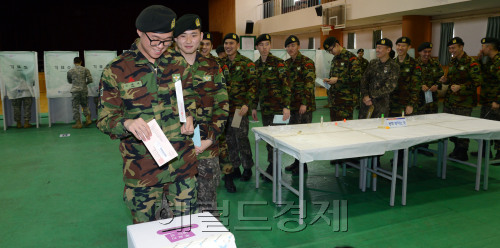Pre-election polls leave many clueless with differing results
By Korea HeraldPublished : April 5, 2012 - 20:54
A flurry of public opinion polls came out this week as the campaign for the April 11 general election intensified.
Instead of giving an indication of the latest state of the races, however, the polls painted a more muddled picture than before, with conflicting results.
In one case, two surveys conducted just a day apart produced a different frontrunner in Seoul’s Yeongdeungpo-A constituency.
One poll, commissioned jointly by three broadcasters and released Monday, put ruling Saenuri Party candidate Park Sun-kyoo at 35.1 percent against the opposition Democratic United Party’s Kim Young-joo’s 30.3 percent.
Another commissioned by the JoongAng Ilbo and released Tuesday had Kim leading Park by 42.6 percent to 32.8 percent.
A similar discrepancy was found in responses for the Western Ilsan district in Gyeonggi Province.
Instead of giving an indication of the latest state of the races, however, the polls painted a more muddled picture than before, with conflicting results.
In one case, two surveys conducted just a day apart produced a different frontrunner in Seoul’s Yeongdeungpo-A constituency.
One poll, commissioned jointly by three broadcasters and released Monday, put ruling Saenuri Party candidate Park Sun-kyoo at 35.1 percent against the opposition Democratic United Party’s Kim Young-joo’s 30.3 percent.
Another commissioned by the JoongAng Ilbo and released Tuesday had Kim leading Park by 42.6 percent to 32.8 percent.
A similar discrepancy was found in responses for the Western Ilsan district in Gyeonggi Province.

The JoongAng’s survey placed Kim Hyun-mi of the DUP 11.1 percentage point ahead of her Saenuri counterpart Kim Young-sun, who came in at 32.2 percent. The broadcasters’ poll, however, found the DUP’s candidate to be trailing by 2.2 percentage points, with 37 percent against the Saenuri candidate’s 39.2 percent.
The two polls, conducted via telephone, had a similar margin of error ― the 95 percent confidence interval for the broadcasters’ poll was plus or minus 4.4 percent and the JoongAng poll’s was plus or minus 4 percent.
Then, why the difference? Experts pointed to a difference in use of samples.
Both polls used random-digit-dialing to poll voters. But, the broadcasters’ survey used a sample of just landline numbers, while the other survey called both landlines and mobile phones.
“Voters who catch calls at their home during daytime are perceived more likely to vote for conservatives, while those who are absent during daytime or use mobile phones only are considered to have more tendency to vote for liberals,” said Yoon Hee-woong, a senior researcher at local pollster Korea Society Opinion Institute.
For this reason, polls conducted with a landline-only sample could overestimate support for Saenuri candidates, Yoon and other experts said
Pre-election polls have been misleading in the past, as well.
In the Seoul mayoral by-election last October, independent Park Won-soon beat Saenuri’s Na Kyung-won by a margin of 7.19 percentage points, although numerous opinion polls suggested a neck-and-neck race.
In a preceding mayoral election, which took place in October, Saenuri’s Oh Se-hoon won by just 0.6 percentage point, but telephone surveys had placed him far ahead of rival Han Myeong-sook by nearly 17 percentage points.
Meanwhile, the National Election Commission on Thursday imposed a ban on use of any means to publish, publicize or disseminate opinion poll results in the 6 days leading up to election day.
By Lee Sun-young (milaya@heraldcorp.com)
-
Articles by Korea Herald




![[Herald Interview] 'Amid aging population, Korea to invite more young professionals from overseas'](http://res.heraldm.com/phpwas/restmb_idxmake.php?idx=644&simg=/content/image/2024/04/24/20240424050844_0.jpg&u=20240424200058)












![[KH Explains] Korean shipbuilding stocks rally: Real growth or bubble?](http://res.heraldm.com/phpwas/restmb_idxmake.php?idx=652&simg=/content/image/2024/04/25/20240425050656_0.jpg&u=)

